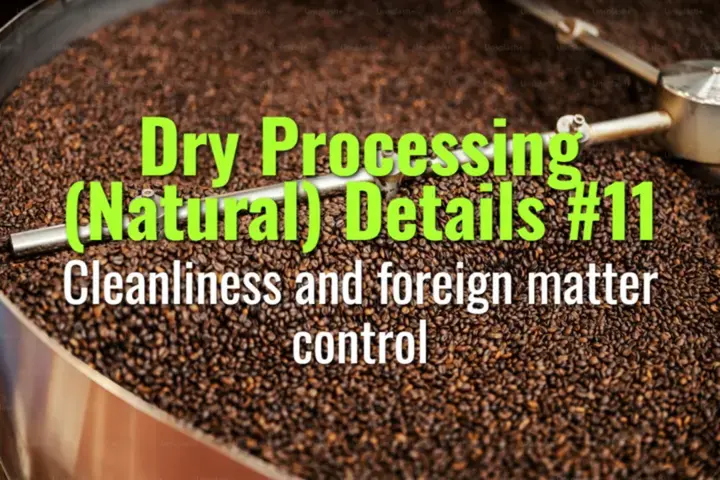Cleanliness and foreign matter control
This topic explains why cleanliness and foreign matter control are critical in natural (dry) coffee processing, the common contaminants that occur, and how producers prevent them to protect quality and safety.
- Coffee Basics Nerds
- 2 min read
Article 11 of 12 in Dry Processing (Natural) Details/

Why Cleanliness Matters
- Natural coffees dry with cherries intact, exposed to the environment for weeks.
- Without strict hygiene, beans can be contaminated with soil, stones, sticks, animal droppings, or mold spores.
- Cleanliness safeguards both cup quality and food safety.
Common Foreign Matter in Naturals
- Physical contaminants: Stones, sticks, leaves, plastic, or metal fragments.
- Organic contaminants: Moldy cherries, insect parts, animal droppings.
- Dust and dirt: From patios or unclean drying surfaces.
Risks of Poor Cleanliness
- Cupping defects: earthy, dirty, or baggy flavors.
- Food safety concerns: mycotoxins from mold, physical hazards for consumers.
- Market rejection: Export buyers require cleanliness standards.
Best Practices for Cleanliness & Control
1. Pre-Drying Stage
- Sort cherries at reception to remove visibly contaminated fruit.
- Wash or float cherries to remove debris when water is available.
2. Drying Stage
- Use raised beds to avoid ground contact.
- Keep drying surfaces clean and free of dust or pests.
- Protect cherries from animals and contamination during drying.
3. Post-Drying Stage
- Hand sorting or mechanical cleaning to remove sticks, stones, and defects.
- Use magnetic separators and destoners in dry mills.
- Optical sorters for precise defect and contaminant removal.
Quality & Market Benefits
- Clean coffee lots score higher in cupping.
- Compliance with buyer and certification standards.
- Higher trust and reputation in specialty markets.
Challenges
- Labor-intensive, especially hand sorting.
- Infrastructure costs for advanced cleaning equipment.
- Requires continuous discipline across the harvest season.
Lasting Importance
Cleanliness and foreign matter control are non-negotiable in natural processing. By keeping lots free of contaminants, producers ensure safe, clean, and high-value coffee, protecting both farmer reputation and consumer confidence.